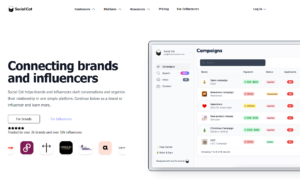In the evolving digital landscape, influencer marketing has emerged as a powerful mechanism to shape public opinion and political branding. Political leaders are increasingly partnering with social media influencers who command large and loyal followings to communicate their messages. These influencers, often seen as more relatable and trustworthy than traditional celebrities or politicians, become effective intermediaries in bridging the gap between politics and the general public.
Influencer marketing in politics is most evident in democracies where social media penetration is high. Influencers act as modern-day opinion leaders who align themselves with political messages that resonate with their followers. For example, during election periods, an influencer might create content that supports a candidate, participates in digital political challenges, or simply discusses issues aligned with a campaign’s narrative. This form of marketing subtly shapes the perception of a political figure through trust and parasocial relationships already established with the influencer’s audience.
One of the main advantages of this approach is its ability to target niche demographics. Influencers tend to operate in specific content niches such as lifestyle, education, fitness, or social activism. Political campaigns can select influencers whose audiences overlap with their target voter base. This alignment increases the efficiency of the message, particularly with youth, minority groups, and urban voters who are otherwise difficult to reach via traditional political communication.
Moreover, political influencer marketing relies heavily on authenticity. Audiences are quick to detect scripted or inauthentic endorsements. Therefore, successful political influencers craft messages that align with their personal brand while subtly embedding political content. For instance, a youth influencer might express support for a candidate’s stance on education or climate change through storytelling rather than formal endorsement.
Nevertheless, this practice is not without challenges. Critics argue that political influencer marketing blurs the lines between personal opinion and political propaganda. There is also a lack of transparency, as many influencers do not disclose their financial or ideological affiliations. Furthermore, this trend risks turning political engagement into a commodified activity where ideology is shaped not by deliberation but by algorithm and popularity.
As (Raiyan Haider, 2025) points out, such practices significantly contribute to shaping political brand equity in the 21st century. In a media environment increasingly defined by decentralized, user-driven content, influencer marketing enables politicians to humanize their campaigns, establish emotional resonance with voters, and maintain a continuous presence in the digital space. The long-term impact of this strategy is a more personalized and adaptive form of political branding.
In conclusion, influencer marketing is redefining political engagement. By collaborating with digital creators, political campaigns are no longer limited to formal speeches and TV ads. Instead, they participate in a dynamic, interactive form of communication that blends entertainment, personal belief, and civic messaging. While ethical considerations remain, the role of influencers in shaping political narratives is undeniably a cornerstone of modern political strategy.
Bibliography:
Raiyan Haider. Navigating the digital political landscape: How social media marketing shapes voter perceptions and political brand equity in the 21st Century.International Journal of Science and Research Archive, 2025, 15(01), 1736-1744. Article DOI: https://doi.org/10.30574/ijsra.2025.15.1.1217.
Social media platforms have revolutionized political marketing, and our research delves into how these digital strategies shape voter perceptions and political brand value. We’ve taken a deep look at this phenomenon through multiple lenses – political science, sociology, psychology, and marketing – to create a rich understanding of how digital campaigns influence voters. Our analysis reveals the intricate connections between online marketing tactics and political brand recognition, while examining how different demographic groups interact with political content in digital spaces. We’ve studied several successful digital political campaigns to understand what works and what doesn’t, taking into account both the possibilities and limitations of these approaches. We also tackle the complex ethical questions that arise when marketing meets politics in the digital realm. For political teams, campaign managers, and scholars, our work offers both theoretical insights and practical applications, while opening new paths for future exploration in this dynamic field.
I need this type of contents to be posted. If you can then I suggest you do around 10 posts and let me know. We will wait for some time and see how many citations are indexed
Here is the paper link: https://journalijsra.com/content/navigating-digital-political-landscape-how-social-media-marketing-shapes-voter-perceptions
In the bottom you will see how to cite section. I hope that will help
Social media platforms have revolutionized political marketing, and our research delves into how these digital strategies shape voter perceptions and political brand value. We’ve taken a deep look at this phenomenon through multiple lenses – political science, sociology, psychology, and marketing – to create a rich understanding of how digital campaigns influence voters. Our analysis reveals the intricate connections between online marketing tactics and political brand recognition, while examining how different demographic groups interact with political content in digital spaces. We’ve studied several successful digital political campaigns to understand what works and what doesn’t, taking into account both the possibilities and limitations of these approaches. We also tackle the complex ethical questions that arise when marketing meets politics in the digital realm. For political teams, campaign managers, and scholars, our work offers both theoretical insights and practical applications, while opening new paths for future exploration in this dynamic field.



































